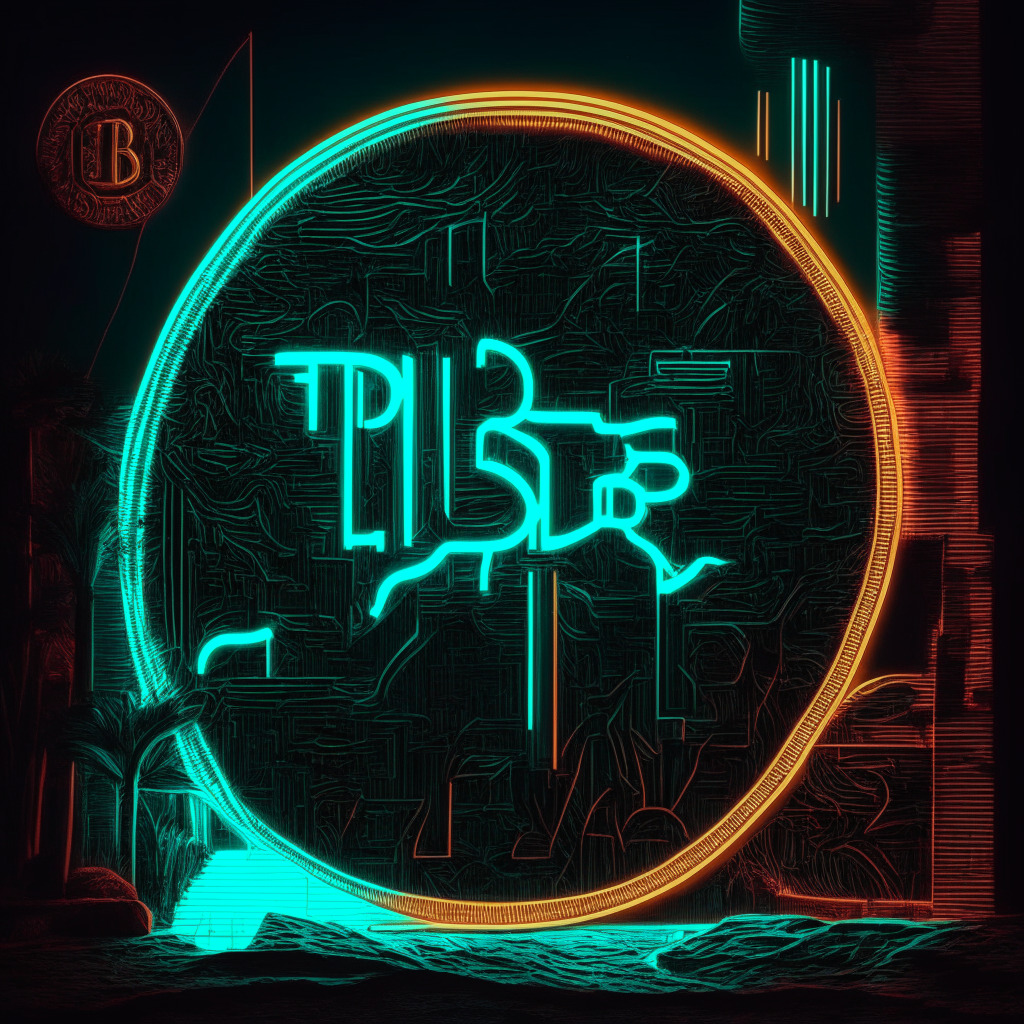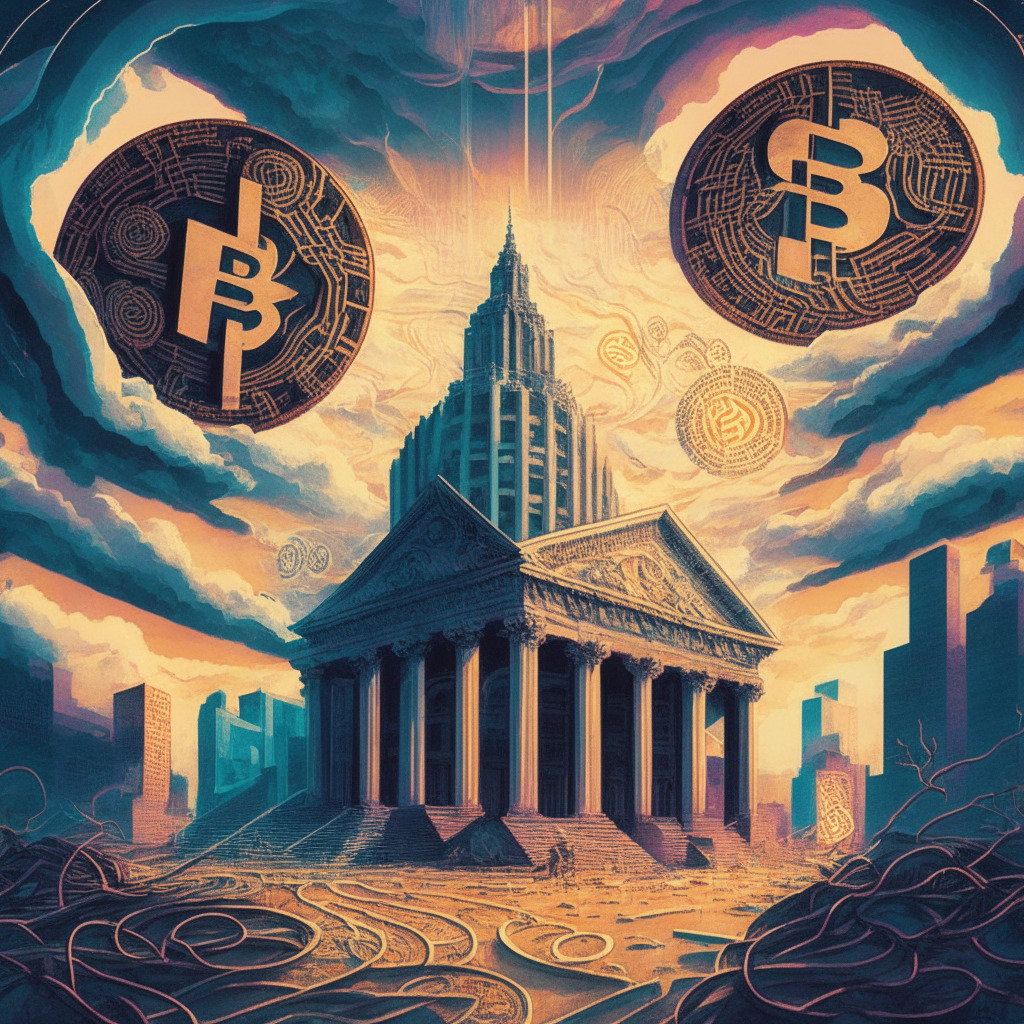Congressman Tom Emmer plans to introduce an amendment to minimize SEC’s crypto oversight, highlighting overreach by chairman Gary Gensler. Emmer emphasizes the need to cease enforcing funds for digital assets until clear regulations are defined, reducing unnecessary compliance burdens and promoting innovation. However, the lack of concrete crypto regulation poses risks and challenges. Balancing regulation and protection of investors’ interests is paramount in propelling the crypto realm forward.
Search Results for: RSI
Navigating the Tightrope: Federal Oversight and the Future of Blockchain Technology
Vice Chairman of the Federal Reserve, Michael Barr, in a fintech event, emphasized the need for regulatory oversight in the swift adoption of blockchain technology. He discussed the basic research into Central Bank Digital Currency (CBDC), potential for stablecoin legislation, and the significance of balancing innovation with potential risks.
Navigating Binance’s Controversial Actions: Million Dollar Refunds and Rug Pulls Fallout
“Binance plans to refund 887 users who were unable to redeem their staked CYBER tokens due to borrowing by opportunistic traders during a liquidity crunch. The compensation includes 800,000 USDT and 871 CYBER in staking rewards, along with 200,000 USDT worth of vouchers from CyberConnect Foundation. The incident has led to a discussion on better safeguards and decision-making processes in crypto exchanges.”
Blockchain Literacy in Nigeria: A Struggle Amidst Linguistic Diversity and Regulatory Obstacles
Despite the growing blockchain and crypto awareness in Nigeria, key challenges remain around public education. Linguistic diversity poses difficulties in a country where over 500 languages are spoken. A disconnection between local banks and crypto-exchange firms further complicates the landscape. Nevertheless, Nigeria is proactive in overcoming these hurdles by implementing language-friendly education strategies about blockchain technology.
Grayscale’s Stalled Bitcoin ETF Conversion: A Tussle with the SEC and its Impact on Crypto Adoption
Grayscale, a major crypto investment firm, is in talks with the U.S. Securities and Exchange Commission (SEC) regarding its stalled Bitcoin Exchange-Traded Fund (ETF) conversion proposal. Grayscale argues that stakeholders deserve a swift resolution, while the SEC focuses on minimizing potential fraud in the volatile Bitcoin market. This confrontation could significantly influence crypto’s mainstream financial acceptance.
MetaMask’s Bold Moves: Expanding Crypto Conversion Amid Scam Woes
MetaMask has enhanced its user experience by allowing ETH conversion to fiat currency. Despite advancements, it faces scamming challenges with fraudsters creating bogus MetaMask sites for illegal activities. Users need to be vigilant and proactive in reporting any suspicious activity or compromised security details to MetaMask.
Robinhood’s Controversial Stock Buyback: The Future of Crypto Regulation or threat to Decentralization?
“The share repurchase agreement that Robinhood has recently agreed with the U.S. Marshal Service might have ramifications on government control in cryptocurrency. While this agreement could offer more investor protection and market longevity, critics worry about potential disruption to the principles of cryptocurrencies – primarily decentralization and immunity from governmental manipulation.”
Unraveling TRYB: The Turkish Lira-Pegged Stablecoin’s Unprecedented Rise and Lingering Controversies
“Emerging from traditional U.S. dollar-pegged digital assets is TRYB, a new stablecoin backed by the volatile Turkish lira. Issued by the Turkey-based fintech company BiLira, this Ethereum-based stablecoin offers a unique transactional instrument for users, navigating around fiat counterparts’ volatility. However, suspicions surround its operations, and the stablecoin’s path is marked with both opportunities and skepticism.”
HashKey Capital’s Altcoin Gamble: Diversification Strategy or Risky Business?
Despite Bitcoin and Ether being obvious investment choices, Hong Kong’s HashKey Capital decided to diversify its portfolio by investing significant portions in altcoins. Despite facing risks, this move holds potential for enormous profitability and has created quite a buzz among high-net-worth individuals and investment firms.
Diversifying Crypto Investments: HashKey Capital’s Novel Strategy and the Implications for Digital Assets
Hong Kong’s HashKey Group, through HashKey Capital, is taking an interesting approach with its new fund, planning to allocate less than half of its portfolio to Bitcoin and Ethereum. The strategy seems to suggest an increased focus on alternative cryptocurrencies, driven by the weaker performance of the Hong Kong stock market and the rising demand for above-market returns in cryptocurrency.
Navigating the Bitcoin ETF Maze: Analyzing SEC Delays, Market Volatility, and Portfolio Diversification Strategies
The U.S. SEC has delayed rulings on Bitcoin ETFs until October 2022, causing a mix of hope and apprehension among crypto enthusiasts. BlackRock’s proposal is particularly hopeful. Meanwhile, volatility in Bitcoin’s price leads analysts to recommend diversifying portfolios with overlooked altcoins like Maker (MKR).
Robinhood Expands Reach: Now Supports Bitcoin and Dogecoin alongside Diversified Swap Features
“Robinhood Markets Inc. now supports bitcoin and dogecoin transactions, diversifying beyond Ethereum. With its expansion, Robinhood is also gradually deploying swap features for select users. But with complex capabilities come greater security challenges, calling for secure transitions to maintain customer trust. The move embodies the blockchain future of diverse, flexible asset transactions.”
Grayscale’s Triumph or SEC’s Trap: Decoding the Bitcoin Trust-to-ETF Conversion Conundrum
The SEC’s recent court decision against their rejection of Grayscale’s Bitcoin trust-to-ETF conversion is not a clear victory for Bitcoin. Future uncertainty remains, as Grayscale’s application could face another SEC rejection on different grounds. This development reorganizes the status quo, urging a cautious response due to the SEC’s unpredictable stance.
Court Orders SEC Reevaluation: Grayscale’s Path to Bitcoin ETF Conversion
“A federal court has directed the U.S. Securities and Exchange Commission to reconsider its dismissal of Grayscale Investments’ bid to convert its Bitcoin Trust into a bitcoin exchange-traded fund. Although the conversion could potentially eliminate GBTC’s discount completely, there are hurdles and complexities in this fluctuating financial landscape.”
The Controversial Loan Request by Wintermute Trading: A Threat to Yearn’s Decentralization?
“Wintermute Trading faces criticism as they negotiate a loan of 350 YFI tokens from Yearn Finance. Yearn’s supporters challenge the benefit to Yearn from this deal, questioning its alignment with Yearn’s philosophy of decentralized finance. The main issue lies in Wintermute’s intention to borrow Yearn’s governance token, potentially undermining Yearn’s foundation of decentralization.”
Shackles or Safeguards? Federal Reserve’s Crypto Oversight Fuels Global Expansion
The Federal Reserve’s intensified scrutiny of banks’ cryptocurrency activities has sparked criticism from Republican lawmakers who argue this deters institutions from participating in the digital asset landscape. The Fed’s new requirements may potentially suppress the progress of decentralized finance. Amidst this, U.S. regulations on digital assets remain unclear, pushing some crypto companies to explore alternative markets overseas. The discourse focuses on balancing effective supervision with fostering blockchain innovation.
Crypto Controversies: Tornado Cash’s Legal Troubles, FTX Founder Behind Bars, and Huge Bitcoin Concentration
“The crypto industry is grappling with legal and ethical challenges, whilst showing high-risk, high-reward nature. With recent controversies involving Tornado Cash co-founders, FTX founder, and the parent company of Prime Trust, it’s clear that proper evaluation and risk-assessment are crucial.”
Regulatory Tightrope in Crypto: Worldcoin’s Controversial Practices VS Digital Euro’s Promise
“The Worldcoin project, known for its retinal scans to differentiate humans from bots, is under scrutiny for potential violations of regulations, including data privacy and security threats. This situation highlights the necessity for balanced regulatory adherence as the crypto-space evolves, emphasizing consumer protection. On a separate note, the introduction of the digital euro could harmoniously coexist with private payment solutions, addressing cross-border payment issues and increasing accessibility.”
MakerDAO’s Investment Risk: Parsing the Pros and Cons of Blockchain Credit Platforms
An upcoming default on tokenized loans threatens blockchain-based platform, MakerDAO’s $1.84 million investment. A borrower from the credit pool, currently in a court dispute, is on the edge of liquidation, raising questions about the robustness of blockchain credit platforms.
Navigating the Ethical Minefield: Worldcoin’s Biometric Crypto Revolution & Its Controversies
“Worldcoin project, with its audacious ambition of creating a biometrically verified digital ID for every global citizen, has reignited global dialogues on data privacy. It’s faced mixed reviews for potentially manipulating less privileged communities by offering wealth in exchange for personal data.”
Ethereum’s Balancer Protocol Security Concern: The Persistent Challenge of Blockchain Safety
“The blockchain space faces security concerns following a vulnerability warning by Ethereum and DeFi protocol, Balancer. Balancer disclosed $2.8 million hangs in balance, urging users to withdraw their assets. Despite the risk, the incident underscores the importance of maintaining solid security within the blockchain technology.”
Tornado Cash Controversy: Balancing Blockchain Privacy and Regulatory Oversight
The US Department of Justice has accused Tornado Cash’s developers of facilitating money laundering and sanctions violations through their Ethereum-based privacy protocol. This situation raises concerns over the delicate balance between financial privacy, integral to crypto and blockchain technology, and regulatory oversight to prevent illicit transactions. The outcome will significantly impact the future of blockchain development.
BNB Value Dips Amid Binance Controversies: Ripple Effects & Possible Solutions
“The BNB crypto token has experienced a decrease in value due to Binance’s questionable activities and increasing legal scrutiny, affecting its $32 billion market position. Binance’s involvement with offshore funds movement amid international sanctions has heavily impacted BNB’s value and broader digital currency markets.”
Decoding the Legal Matrix: Tornado Cash, DAOs, and the Future of Blockchain Oversight
A recent legal case saw a federal judge approving U.S. Treasury’s sanctions on Tornado Cash, a crypto tool allegedly used by North Korea for money laundering. The ruling, which validated an enforcement action against a Decentralized Autonomous Organization (DAO), sets a compelling precedent for DAOs’ future role in crypto projects.
Mantle’s Strategic Gamble: Staking ETH, Treasury Diversification, and Community Empowerment
“Mantle, a Layer 2 network, has staked 40,000 ether on staking protocol Lido, signifying a strategic shift. This stake, equivalent to approximately $66 million, is expected to generate 4.1% APR adding to Mantle’s $3.2 billion treasury. Following a governance vote, community members now have the power to strategize treasury management.”
Privacy vs. Transparency in Blockchain: A Look at Friend.tech’s Controversial Crypto Wallet Leak
“In the blockchain sector, privacy and security are essential. However, the release of a list of crypto wallet addresses connected to Friend.tech users on a GitHub repository stirred controversial discussion. The concern arises from the potential of viewing blockchain transactions linked to those wallets. As the blockchain technology continues to infiltrate social platforms, users should remain wary of the risks associated with data visibility.”
Crypto Markets Calm as Storm Brews Behind the Scenes: Failures, Diversification, and Anticipated Swings
Major cryptocurrencies showed a stable trend, despite turbulence like the slump of SHIB partially due to its unsuccessful Ethereum layer 2 network, Shibarium. Ethereum co-founder, Vitalik Buterin, transferred $1 million worth of cryptocurrency whilst facing a market downturn. This turbulent environment led to a strategic shift for bitcoin miners into new business areas.
Exploring the New Horizons: How Crypto Miners Diversify Revenue Streams into AI Market
“Bitcoin and Ether miners are branching into new business areas including high performance computing services for the artificial intelligence industry, seeking to diversify revenue and reduce crypto reliance. This follows the Ethereum blockchain Merge, leaving a surplus of GPUs on the secondary market, used for gaming, rendering services and mining other cryptocurrencies.”
Clashing Giants: Gitcoin and Shell’s Controversial Partnership for Blockchain Climate Solutions
The blockchain platform Gitcoin and oil-rich Shell have formed a controversial partnership aimed at developing “open-source climate solutions.” Many critics within the crypto community view this alliance as questionable, indicating that the intersection between advanced blockchain technology and ethical responsibility remains a significant challenge.
Navigating Bitcoin’s Future Trajectory Amid Persisting Market Risks
“Bitcoin has rallied by 70% since the beginning of the year. Markus Thielen, Matrixport’s Head of Research and Strategy, warns that should the trendline be invalidated, Bitcoin might face more significant losses. Careful observation and strategic adaptations will be key.”
Sei: New Trading-Focused Blockchain Star Amid Controversies and Growing Expectations
“Sei, a trading-focused blockchain network created by Jump Crypto and Multicoin Capital, debuted a market cap of over $400 million. Despite a successful launch, controversy over a delayed airdrop and eligibility issues, coupled with a lack of transparency, have raised concerns. 40% of SEI’s circulating supply is for the team and private investors, 48% for airdrops and ecosystem reserves, with the rest for the SEI Foundation and Binance launchpool incentives.”
Legal Turbulence in Crypto Sphere: Navigating Regulatory Challenges Amidst Swirling Controversies
Navigating through the complex labyrinth of regulatory challenges in the blockchain and crypto world, we see important incidents arising, such as a $100M lawsuit against a Filecoin mining service in China, over alleged pyramid scheme fraud. This emphasis on the need for comprehensive regulations in the crypto sector to maintain market integrity and protect investors.































